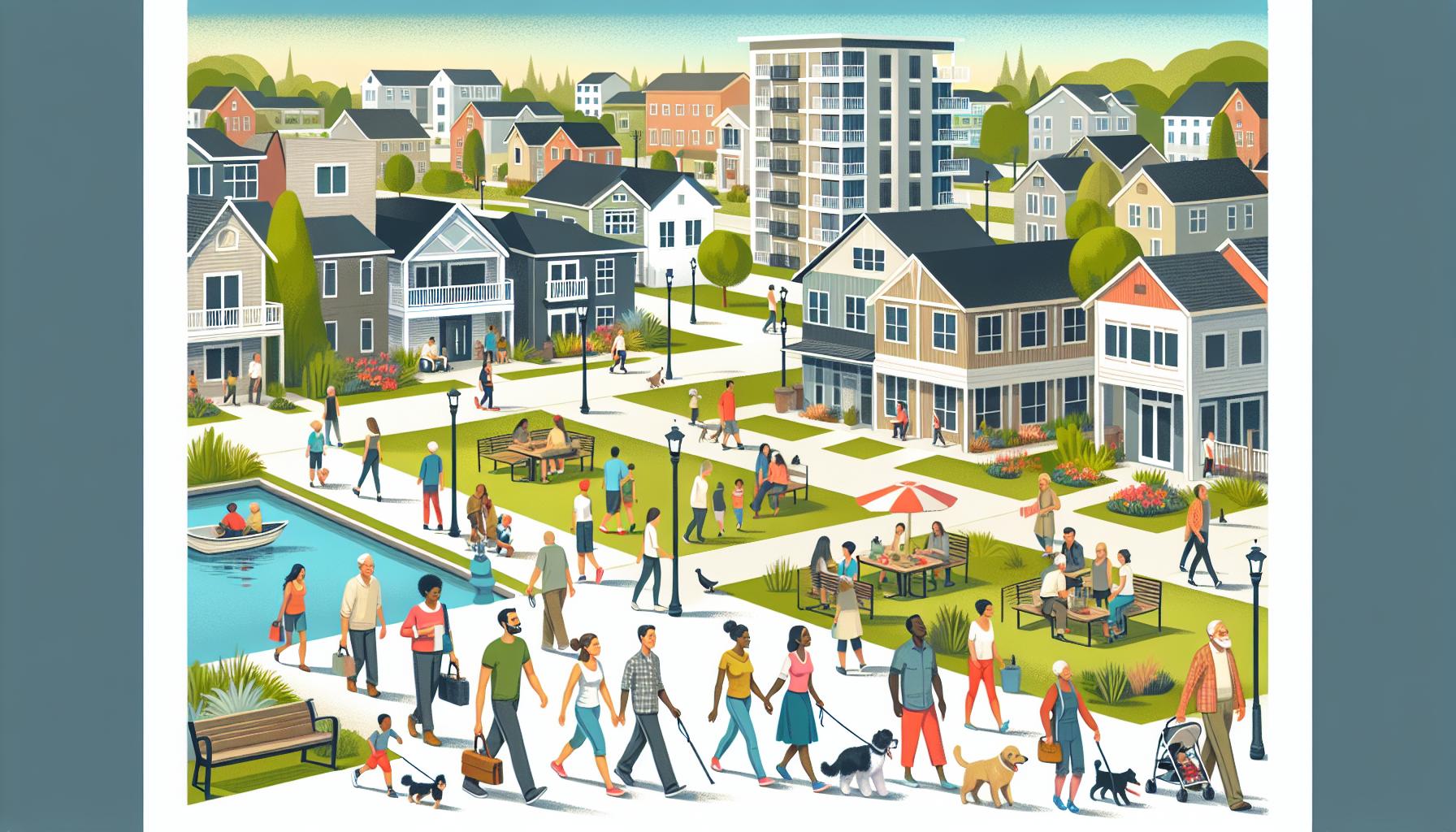Key Takeaways
- Concord’s rental market is highly competitive, with rental prices influenced by factors such as location, property type, and amenities.
- Average rental costs range from $1,800 to $2,500 for apartments and start around $2,800 for single-family homes, with pricing trends affected by seasonal demand.
- Neighborhoods like Downtown Concord, Clayton Valley, and Ellis Lake are popular among renters, offering amenities like parks, schools, and shopping centers, while emerging areas like Monument Corridor and North Concord are gaining traction.
- Low vacancy rates, averaging 4-5% for apartments and below 3% for larger homes, indicate high demand, especially for budget-friendly properties.
- Economic factors, including job growth, inflation, and interest rates, directly affect rental affordability and availability, making it essential for renters to stay informed.
- Future trends point to sustained demand due to population growth and infrastructure developments, making timing and preparation key for securing the right rental in Concord.
Finding the right rental in Concord can feel like a challenge, especially with so many factors to consider. Whether you’re searching for affordability, convenience, or a place that truly feels like home, understanding the local market is key. But how do you make sense of trends and opportunities without feeling overwhelmed?
I’ve spent time exploring what makes Concord’s rental market tick, and I know how important it is to have clear, actionable insights. From pricing shifts to neighborhood highlights, there’s so much to uncover. What are the current trends, and how can they impact your next move? Let’s break it down together so you can approach your search with confidence and clarity.
Overview Of Concord Rental Market
Concord’s rental market presents a mix of opportunities and challenges for potential renters. Monthly rental rates typically vary based on the property type, size, and neighborhood. For instance, one-bedroom apartments are often more affordable than multi-bedroom homes, though availability impacts pricing.
Demand is consistent, with interest concentrated in areas known for amenities like parks, schools, and shopping centers. Some neighborhoods see higher turnover rates, resulting in more frequent openings. This variability makes timing an important factor in securing a good property.
Understanding price trends helps in setting realistic expectations. Average rents for apartments range between $1,800 and $2,500 per month, depending on condition and exact location. Houses for rent generally start around $2,800 per month but can climb significantly for larger properties or premium locations.
What are you looking for in a rental property? Different areas cater to various priorities, from accessibility to public transportation to quieter, suburban environments. Knowing your preferences helps refine your search and identify suitable options.
Rental availability can change quickly. Keeping a close eye on listings and being ready to act improves your chances in this competitive market.
Current Trends In Rental Prices

Rental prices in Concord continue to reflect high demand, with location and property features driving costs. Understanding these trends can help renters plan their budgets effectively and make informed choices.
Average Rental Costs
Rental costs in Concord vary based on unit size and amenities offered. One-bedroom apartments typically range between $1,800 and $2,500 per month. Larger units and homes start at $2,800, with premium properties and additional bedrooms increasing costs further. How does this align with what you’re budgeting for your rental?
Seasonal shifts can affect prices, especially during peak moving months like summer. Higher-demand periods might require acting quickly to secure listings within your price range.
Variations Across Property Types
Properties with additional features like modern finishes, parking spaces, or access to recreational areas generally demand higher rents. Apartments tend to cater to those seeking lower upfront costs, while single-family homes attract renters who prioritize space and privacy.
Neighborhoods hosting parks, schools, and other amenities often see stiffer competition, driving up rental figures. Selecting a property type that balances your priorities with cost can help narrow down viable options. What criteria matter most to you in your rental search?
Demand And Supply Dynamics

Understanding the interaction between demand and supply can give you a clearer picture of Concord’s rental market. By examining vacancy rates and demand drivers, you can pinpoint trends that impact rental availability and pricing.
Rental Vacancy Rates
Vacancy rates reveal valuable information about housing availability in Concord. Low vacancy rates often signal high demand, pushing rental prices upward. Currently, vacancy rates for apartments hover around 4-5%, while larger homes remain slightly more scarce, often below 3%. These tight conditions mean finding rentals may take longer, especially for budget-friendly options.
Seasonal patterns also influence vacancy rates. During summer, higher turnover and relocations increase demand, often lowering vacancies even further. What’s your plan if availability drops during your search? Preparing for such challenges can improve your chances of securing the right property.
Factors Influencing Demand
Several key factors shape rental demand in Concord. Proximity to workplaces, schools, and public transit remains a top priority for many renters. Neighborhoods near commuter hubs and education centers often see fierce competition for listings, leading to higher rents.
Lifestyle preferences also drive demand. Properties offering amenities, like updated interiors or access to parks, attract renters willing to pay a premium. Additionally, population growth and rising relocations into Concord have steadily added to housing demand. Have you considered which features matter most to you? Defining your needs can narrow your search in this competitive landscape.
Neighborhood Analysis

Understanding Concord’s neighborhoods helps renters make decisions that align with their priorities. From affordability to amenities, each area offers a distinct rental experience. What matters most to you—proximity to schools, green spaces, or vibrant urban centers?
Popular Areas For Renters
Some neighborhoods in Concord consistently attract renters due to their convenience and amenities. For instance, downtown Concord is ideal for those seeking easy access to public transit, dining, and entertainment. It offers one-bedroom apartments at an average of $2,000 per month. Families often gravitate toward neighborhoods like Clayton Valley, which boasts top-rated schools and access to parks. Rental homes here start around $3,000 per month.
Ellis Lake is another popular area, known for its moderate pricing and a mix of housing options. Apartments average $1,850 to $2,200 monthly, making it suitable for singles and smaller households. For those prioritizing a quieter environment, Bishop Estates offers suburban charm with rental homes starting from $2,900.
Emerging Hotspots
Some areas in Concord have seen rising demand driven by new developments and improved amenities. Monument Corridor, once overlooked, is gaining traction due to revitalization efforts and access to public transport. Average rentals for apartments range from $1,900 to $2,400 per month, drawing young professionals and first-time renters.
North Concord, situated near the BART station, appeals to commuters looking for convenience. Multifamily housing developments in this area have attracted attention, with rentals averaging about $2,000 monthly for mid-sized units. Areas near the Concord Pavilion have also emerged as desirable for those seeking recreational facilities and affordable pricing.
What do you prioritize—affordability, proximity, or lifestyle features? Evaluating neighborhoods based on personal needs can help renters find a place that genuinely fits their preferences.
Impact Of Economic Factors

Economic factors directly shape Concord’s rental market, influencing everything from monthly rates to property availability. Shifts in employment, inflation, and interest rates drive these trends, making them vital for renters to consider.
Employment Rates And Growth
Job growth and unemployment rates are key indicators affecting rental demand. Concord’s proximity to major employment centers draws individuals and families seeking housing closer to work. Higher employment levels typically lead to increased rental demand, raising prices in popular neighborhoods.
When local industries expand, they attract a workforce needing housing. How might this affect your own rental options? Areas near growing commercial hubs, for instance, often experience tighter competition and rent increases. Considering current job market trends can help renters plan strategically.
Influence Of Inflation And Interest Rates
Inflation impacts rental prices by increasing property maintenance and operational costs for landlords, often passed along to tenants. In Concord, this means rents may consistently rise even in moderately priced neighborhoods. Monitoring inflation trends allows renters to anticipate budget adjustments more effectively.
Rising interest rates further complicate affordability. When borrowing becomes more expensive, property acquisitions slow, tightening rental inventory. This drives demand for existing properties and pushes prices higher, particularly for homes. Are you monitoring economic changes to stay prepared for how these factors could affect your housing options? Being informed helps renters make decisions aligned with personal budgets and priorities.
Future Outlook For The Concord Rental Market

Rental demand in Concord shows no signs of slowing. Population growth, coupled with continued interest in neighborhoods offering a mix of suburban comfort and accessibility, keeps pressure on housing availability. Renters may face more competition for sought-after properties, especially those near transit routes, schools, and employment hubs. Do you see yourself prioritizing any of these factors in your search?
Housing inventory could become tighter if construction of new rental units lags behind demand. While some areas, like North Concord, experience development, the timeline for these projects might not immediately impact availability. Rising construction costs and potential regulatory delays may influence how quickly additional properties enter the market.
Economic factors will likely continue shaping rental pricing. Job growth in nearby cities may encourage more individuals to move into Concord, boosting demand in areas with easy commuting options. Inflation and shifts in interest rates could push landlords to increase rents to offset higher maintenance expenses or reduced purchasing power. How might these factors impact your housing budget?
Seasonality will remain a significant factor in rental trends. Summer typically sees peak demand as families and students relocate, which raises prices and limits availability. Those seeking to move during less competitive months, such as winter, might find better opportunities to secure listings at lower rates.
Neighborhoods poised for growth could attract more renters in the future. Areas undergoing infrastructure improvements or gaining amenities will likely see increased interest. Renters focusing on affordability may gravitate towards these emerging locations to find homes that match their preferences. Have you considered exploring neighborhoods currently under development?
Conclusion
Navigating Concord’s rental market requires a thoughtful approach, especially with the dynamic factors influencing pricing and availability. Staying informed about local trends, neighborhood characteristics, and economic shifts can make a significant difference in securing the right rental.
By prioritizing personal needs and acting quickly in this competitive market, renters can improve their chances of finding a property that fits their budget and lifestyle. Concord offers a range of options, but understanding the nuances of demand and timing is key to making confident decisions.
Frequently Asked Questions
What is the average rent for apartments in Concord?
The average rent for apartments in Concord ranges from $1,800 to $2,500 per month, depending on factors like size, location, and amenities. One-bedroom apartments are generally more affordable than multi-bedroom units.
How much do rental homes in Concord typically cost?
Rental homes in Concord generally start at $2,800 per month, with costs increasing for larger homes or those in premium neighborhoods with added features like modern finishes and recreational access.
Which Concord neighborhoods are best for renters on a budget?
Ellis Lake is a great option for budget-conscious renters, with apartments averaging $1,850 to $2,200. Monument Corridor and North Concord are other affordable areas gaining popularity due to new developments.
When is the best time to find a rental in Concord?
Summer is the busiest season for moving, with high demand and lower vacancy rates. Spring and winter might offer more availability and potentially lower competition for rentals.
What factors drive rental demand in Concord?
Proximity to workplaces, schools, public transit, and amenities like parks are major demand drivers. Lifestyle preferences, such as modern interiors, also contribute to higher rental competition.
How can I find a rental within my budget in Concord?
Define your priorities, such as location or desired features, and stay vigilant about new listings. Exploring emerging neighborhoods like North Concord can also provide more affordable options.
What are the vacancy rates in Concord’s rental market?
Apartment vacancy rates are around 4-5%, while larger homes have lower rates, often below 3%, reflecting high demand and limited availability.
How do economic factors affect Concord’s rental prices?
Economic factors like job growth, inflation, and interest rates influence rental costs. High employment and population increases drive demand, while inflation raises property maintenance costs, often passed on to tenants.
Are there family-friendly neighborhoods in Concord?
Yes, Clayton Valley is a family-friendly neighborhood with top-rated schools and parks. Rental homes in this area start at around $3,000 per month.
What trends should renters in Concord be aware of?
Rental demand remains high, with tight inventory and seasonal patterns, especially in summer. Emerging neighborhoods and economic shifts like inflation and rising interest rates also impact affordability and availability.
